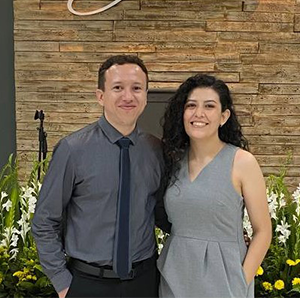-
Learning through Shared Experiences
Written by Michelle J. Goff, founder and director of Iron Rose Sister Ministries

Experience is the best teacher. Some things cannot be taught in a classroom, but rather must be learned in a real-life context. I can tell you how to do several things, but until I show you, until we share an experience through which we can learn together and strengthen our Christian bond, mere teaching will always fall short.
Jesus lived day in and day out for three years with the 12 apostles. We see Him teaching the crowds, but He spent even more concentrated time with His closest disciples (men and women). He revealed more to them than He did to the public. He explained the meaning behind the parables. He gave them a vision for what they would be called to do in the future.
Paul followed a similar pattern with those he mentored. Check out the summary of shared experiences with Timothy, whom he considered his “true son in the faith” (1 Tim. 1:2; 2 Tim. 1:2).
10 You, however, know all about my teaching, my way of life, my purpose, faith, patience, love, endurance, 11 persecutions, sufferings—what kinds of things happened to me in Antioch, Iconium and Lystra, the persecutions I endured. Yet the Lord rescued me from all of them. 12 In fact, everyone who wants to live a godly life in Christ Jesus will be persecuted, 13 while evildoers and impostors will go from bad to worse, deceiving and being deceived. 14 But as for you, continue in what you have learned and have become convinced of, because you know those from whom you learned it.(2 Tim. 3:10-14)
It is believed that this was the last letter that Paul penned, likely from a Roman prison. His final words were an encouragement to continue to remain true to Christ’s teaching and to the Word. It was a passing of the baton (2 Tim. 2:2) to his son and close friend. Paul even asked him to bring a cloak he left along the way and his scrolls, especially the parchments (2 Tim. 4:13). This was much more than a casual friendship.
A few verses later, in 2 Timothy 4:19, Paul sent greetings to Priscilla and Aquila, among others. In Acts 18, we learn that Priscilla and Aquila were Jews who had been living in Rome, but after getting kicked out by Claudius, ended up in Corinth. Since they were tentmakers, like Paul, he stayed and worked with them. They became his “home base” while in Corinth, which was “for some time” (Acts 18:18). Later, they join Paul in Ephesus, where they instructed Apollos about “the way of God more accurately” (Acts 18:26).
Priscilla and Aquila were like family. They had worked together in secular and Kingdom work in the port city of Corinth. We know from Paul’s two lengthiest letters that the church in Corinth struggled extensively. And based on a reference in 1 Corinthians 7, there were likely more than just two letters written to that church.
These three tentmakers had the blessing of never walking alone through a time of spiritual struggle in a church. They had a kindred spirit as family and support. It is no wonder Paul sent greetings to them by name in more than one letter.
Another disciple of Christ that Paul considered family, even a son, was Titus.
4 To Titus, my true son in our common faith: Grace and peace from God the Father and Christ Jesus our Savior. 5 The reason I left you in Crete was that you might put in order what was left unfinished and appoint elders in every town, as I directed you. (Titus 1:4-5)
Paul trusted Titus to finish the good work they had started together. If we go back to the time when Paul and Barnabas parted company, we recognize that Paul was picky about who he mentored and who he trusted (Acts 15:36-41). Barnabas mentored John Mark and Paul chose Silas with whom to take his second missionary journey. Later, Paul forgave Mark and even asked for him to visit (2 Tim. 4:11).
The greetings in Romans 16 are evidence of the time Paul spent with each of those people: the shared experiences, being in each other’s homes, the friends and a few relatives, the coworkers, including, of course Priscilla and Aquila. The letter to the Romans was penned by Tertius, who sent along his own greetings (Rom. 16:22). I suspect Tertius got to hear more stories than just what he scribed in the letter to the Christians in Rome.
Which leads me to one final way I will mention that Paul taught: by writing letters together. First Corinthians was written by Paul, along with Sosthenes. Second Corinthians and Philippians were written by Paul and Timothy. First and Second Thessalonians were written by Paul, Silas, and Timothy.
I can’t wait to get to heaven and listen to all the stories shared by the reunion of these old friends and coworkers in the Kingdom. What stories and experiences have you learned through?
#IronRoseSister #teachthroughrelationships #learnthroughrelationships #learnfromamentor #mentoring #Paul #missionsexperience #blog #MichelleJGoff
-
Lifelong Learning
 Written by Deanna Brooks, volunteer with Iron Rose Sister Ministries in Arkansas
Written by Deanna Brooks, volunteer with Iron Rose Sister Ministries in ArkansasToday’s world encourages us to begin saving and investing for retirement with the goal of retiring as early as possible to live a life of leisure.
But… is that found in Scripture? Our Creator in His infinite wisdom made us so that (unless disease sets in) we can continue to learn and serve our entire life.
One of the sweetest promises is in Revelation 2:10b (ESV), “Be faithful unto death, and I will give you the crown of life.”
The apostle John was probably between the age of 80 and 90 and had endured persecution when he wrote these words of Jesus after seeing a vision of heaven—the place Jesus told His disciples He was preparing (John 14:1-3).
Other Bible characters come to mind when I think about continuing to learn, serve, and be faithful.
Noah was 500 years old and had never seen what God told him about, but he believed and obeyed in faith, building the ark that saved his family from the flood.
When God called Abram at age 75, he left his homeland and the idolatry that was prevalent there and followed God in faith. It was another 25 years before the promised son was born, and during these years of waiting, Abraham continued to learn of God’s faithfulness. When he was told to take his son Isaac to Mount Moriah and offer him as a sacrifice, he obeyed because he believed God could raise him from the dead (Heb. 11:17-19). In James 2:23, we read, “And the Scripture was fulfilled that says, ‘Abraham believed God, and it was counted to him as righteousness’—and he was called a friend of God,” faithful until his death at age 175.
Joseph was sold into slavery at age 17, approximately 12 years before his grandfather Isaac died. How often did Joseph hear his aged blind grandfather speak of the trip to Mt Moriah and other stories of faith, keeping those precious words in his heart of how God kept His promises?
Genesis 50:20-21 shows us Joseph’s faith which led him to show kindness towards his brothers.
“’As for you, you meant evil against me, but God meant it for good, to bring it about that many people should be kept alive, as they are today. So do not fear; I will provide for you and your little ones.’ Thus he comforted them and spoke kindly to them.”
Moses reached his peak beginning at age 80, 40 years after fleeing the palace of Egypt. During the last 40 years of his life, he met with God, learning to follow God as he led approximately two million Israelites out of Egypt, then wandered in the wilderness for 40 years.
Solomon asked of the LORD: “Give your servant therefore an understanding mind to govern your people, that I may discern between good and evil...” (1 Kings 3:9). However, later Solomon chose to make alliances with foreign nations, taking foreign wives, and building places for worshiping their foreign gods. Towards the end of his life, Solomon wrote Ecclesiastes, saying that the pleasures he chased were meaningless, and closing with these words in 12:13b, “Fear God and keep his commandments, for this is the whole duty of man.”
Daniel was a prophet during the reign of six kings who ruled the Babylonian and Medo-Persian empires for about 70 years. Daniel had three events where he faced near-certain death, found in chapters 1, 2, and 6. He prophesied about the Messiah who would come during the last great ancient empire… the Roman Empire.
Luke 2:22-48 tells of Simeon and the widow Anna, aged 84, who never left the temple, “worshiping with fasting and prayer night and day” (v. 37b). The Lord had told Simeon that he would not die until he had seen the Messiah. When Joseph and Mary went to the temple for Mary’s purification, Simeon exalted the baby Jesus and prophesied words of warning to Mary. Anna gave thanks to God and spoke about the Child to all who were looking forward to the redemption of Jerusalem.
Sometimes life is overwhelming, and we have to simply trust Paul’s words in Philippians 1:6: “…he who began a good work in you will bring it to completion.”
Like those who have gone before us, let us all “press on toward the goal for the prize of the upward call of God in Christ Jesus” (Phil. 3:14), ”running with endurance the race that is set before us, looking to Jesus the founder and perfecter of our faith” (Heb. 12:1b-2a).
#IronRoseSister #teachthroughrelationships #learnthroughrelationships #lifelonglearner #befaithfuluntodeath #blog #guestwriter
-
Like Moses
 Written by Johanna Zabala, volunteer with Iron Rose Sister Ministries in Ecuador
Written by Johanna Zabala, volunteer with Iron Rose Sister Ministries in EcuadorWhen we observe each lineage and relate the origins, it is possible to find facts very well anticipated by our Creator and Heavenly Father in His maximum creation, we being an important part of it. Every biblical character teaches holy purposes of our God. Likewise, every being on the face of the earth is designed for every good work and for His service.
We study about Moses in the Old Testament starting in Exodus chapter 2 that mentions his birth. I find that he was a man of God of Hebrew origin, brother of Miriam and Aaron, both older than him. His birth occurred when an Egyptian pharaoh set out to kill all Hebrew children. Definitely for great holy purpose, he was hidden for several months and placed in a basket in the Nile River by his mother to be saved, found by Pharaoh's daughter, who raised him as a Pharaoh's son.
In the midst of a quiet life, Moses, seeing the insensitive work towards the Hebrew slaves, killed a brutal Egyptian watchman who mistreated one of them. Having to flee from there for many years, he reached Midian where he remained for forty years. He married Zipporah and they had a son whom they named Gershom.
Moses is called by God through a burning bush, under the mission of returning to Egypt and freeing the Hebrew people from slavery. Returning to Egypt, the Israelites began to trust him as God's messenger. His greatest challenge or difficulty was convincing Pharaoh to let the slaves go through the ten plagues. But the hard-hearted Pharaoh changed his mind as soon as Moses and the Hebrew people fled. God parted the Red Sea, allowing the Hebrews to pass through and the Egyptians to be entombed within the sea.
In the books of Exodus and Deuteronomy, God delivers to Moses the Ten Commandments on Mount Sinai for the people of Israel. After great controversies, struggles, disobedience, idolatry, weariness of serving the Lord, and also submerged under opposition in the desert, it is said that he did not enter the promised land either (Deut. 1:34-46).
Like Moses, and from my heart too, I will tell you that I am a daughter of God. Born in Venezuela, to a tall and passionate man named Juan, and a beautiful-looking woman with great character, named Marta. From them, I have six siblings, two older than me and four younger than me. I grew up in the care of my maternal grandmother. I was trained in the midst of great opportunities and at the same time with some economic limitations, an experience possibly similar to yours; however, always God provided.
When fearsome adolescence arrived, there were emotional needs, but God continued protecting me. At the age of twenty-one, God gave me my precious first daughter, whom I named Crismarie Alemar, uniting the important things in my life through Christ, Mary, Alejandro and Marta.
At the age of twenty-two, Jesus Christ called me to meet Him and to be part of Him. Being born again by water and Spirit at twenty-three years of age, as we see in John 3:1-21. My life started getting in order and I continued learning.
At the age of twenty-nine, I married my brave husband Jahan Rangel. We have both walked under the direction of the Lord. At the age of thirty-three there was another gift, our handsome second son named Cristian Abdías.
After ten years in social slavery, trials and challenges in our beloved country Venezuela, God allowed us through our daughter to come to Ecuador to continue learning. Those were times of opportunities and challenges, not so much on an economic level, but always on a spiritual level.
The Lord continues to call us to spread the gospel in this city of different cultures and where, as in every place, there is resistance to knowing the greatness of the salvation of the soul and the blessing of eternal life. It is not easy; but neither is it impossible (Luke 1:37).
Among the challenges and difficulties found here, there is the power to achieve what Galatians 6:10 tells us; that is, helping each other as brothers, despite the distrust or xenophobia (rejection of foreigners) among some weaker brothers in faith. This led us to the decision and the need to return to our country of origin, and as Moses did. Romans 8:28 teaches us today that everything works together for good.
To return to our country is to return to Egypt to continue freeing souls for Christ and encouraging the brothers and sisters to remain in the unity of faith, in the midst of tribulations, doubts, and scarcity.
Remembering the Ten Commandments given in the time of Moses and our ten-in-one, and the main one, seen in Mark 12:30-31, it propels our faith to a total dependence on Godwith all our being, soul, strength, and heart, and to love others as we love ourselves.
Likewise, it is necessary to start over each day in the joy of salvation and in prayer (1 Thes. 5:16-18), activating the Holy Spirit of the Father to value, at all times, the great sacrifice of Jesus, because He loved us so much.
Sister, without fear, it is time to strengthen our faith and reflect the peace that comes from Him. Let's not forget Galatians 2:20. Let’s fight together to enter and love the promise of eternal life. Are we encouraged and strengthened towards eternity and in doing the will of God? Amen.
-
Listen Through the Word
 Written by Wendy Neill, Advancement Coordinator for Iron Rose Sister Ministries
Written by Wendy Neill, Advancement Coordinator for Iron Rose Sister MinistriesDo you have a favorite book? It might be from your childhood or something you’ve read as an adult. There’s a good chance you’ve been through it several times, and you love to recommend it to others. It might be a fictional story or a nonfiction book that changed your life. Impactful books are written by authors endowed by God with a special gift for words.
Is the Bible your favorite book? I hope so. We’ve probably all had seasons in our life when it was and seasons when it wasn’t. The author of Psalm 119 had a deep, abiding love for the Word of God which remained steadfast even in difficult seasons (see vv. 81-93). Let’s learn from him.
This author definitely had that God-given gift for masterful writing. He wrote Psalm 119 as an acrostic poem. When you were in school, did you ever have to write an acrostic poem where each line started with the next letter of your name? I was terrible at those. The poem always sounded forced.
Psalm 119 is divided into eight-verse stanzas. Within each stanza, all eight verses start with the same letter of the Hebrew alphabet! It is hard for us to see that artistic form since we aren’t reading it in the original Hebrew. Can you imagine writing eight verses that all begin with a difficult letter, like “X”? This author does it seamlessly and it doesn’t sound forced. He utilizes his exquisite skill and the entire Hebrew alphabet to express his love for God’s Word.
Keep in mind, he is not talking about the full Bible as we know it. He is referring to the first five books of the Old Testament: God’s laws, decrees, statutes, commandments, and ordinances. Here are some ways he describes God’s law:
- Great spoil/treasure/riches - vv. 14, 162
- A delight - vv. 24, 77, 143
- A path - v. 35
- A comfort - v. 52
- A light to our path - v. 105
- Sweeter than honey - v. 103
- A refuge and shield - v. 114
- Better than pure gold - v. 127
- Eternal - v. 160
- A source of great peace - v. 165
I can say that about much of our Bible, but those descriptions aren’t how I would personally describe Leviticus or Deuteronomy. This guy understands that God’s laws are meant to bless us, just as a wise, loving parent’s rules allow a child to thrive in a safe environment.
Throughout this psalm, the author alludes to listening to God through Scripture.
- Teach me your decrees so I can teach others. - vv. 12-13
- I spoke to you and you answered me. - v. 26
- Direct me in the path of your commands. - v. 35
- Teach me knowledge and good judgment. - v. 66
- The law from your mouth is precious. - v. 72
I encourage you to listen to God through His Word this week. Ask Him to teach and direct you. Read Psalm 119 first, then the next day, read from your favorite book of the Bible.
- What is God teaching you as you commit to listening through His written Word?
- How can you fall more in love with Him and the decrees He has set because He loves you?
- Is there someone to whom you can recommend His Book?
By the way, because this author loved God’s statutes so deeply—and used his talent to glorify Him—God added this man’s ode to the Scriptures for all future generations! What an honor!
-
Listening in Small Groups
 Written by Lisanka Martínez, volunteer with Iron Rose Sister Ministries in Venezuela
Written by Lisanka Martínez, volunteer with Iron Rose Sister Ministries in VenezuelaWhen we read in Ephesians 4:29 "Do not let any unwholesome talk come out of your mouths, but only what is helpful for building others up according to their needs, that it may benefit those who listen" (NIV), it is necessary to keep in mind that it is a command for all Christians in all times, places, and circumstances. Because of this, we notice the commitment that it represents to be able to express ourselves, as the Word indicates, so that our speech is edifying for those who listen to us, always avoiding the opposite.
This commitment, I confess, has been an uphill struggle for me on several occasions, and incredibly more so in my life as a Christian. Before I studied the Word, when I read or listened to this verse, it seemed to me to be directed at people who were mean in their language, uncontrolled, or who always spoke with malice and double meanings, offending and mocking others. I thought it was not addressed to me, who, although I said a bad word from time to time, tried to be careful where and to whom I said it, being respectful of the people with whom I had some contact.
Later, as a Christian, I remember an anecdote that happened to me during a discipleship class in which I participated shortly after being baptized.
I arrived 15 minutes early to the meeting set for 8 a.m. and I found only the sister in charge of the class who had been there since 7:30 a.m. The rest of the group arrived in a span of half an hour. Much later, the sister who led the class was the last to arrive with another of the sisters. When I asked them what had happened to them and why they were so late, the accompanying sister told me that it was the time the person in charge had told her because they needed to wait until everyone was there before beginning.
I was very upset, and I let the leader know that I thought it was disrespectful for her to arrive almost an hour late to start the class. My attitude had its immediate response: her face was transformed, and she spent the next half an hour sharing an improvised lecture (with its corresponding biblical passages) in which she explained why a neophyte like me should not call out a more mature woman in the faith. I listened to her speech quietly, still upset, and then we finally moved on to the prepared class material. Of course, nothing she said convinced me that she hadn't disrespected all of us. Being Venezuelan, I should have been used to that characteristic of many of my compatriots: the failure to comply with schedules and the lack of respect for others' time; however, I was not and still am not.
Reflecting on this experience, I now think that she, with more experience in the faith, should have simply apologized to everyone for being late and told me, the insubordinate one, that we would talk more calmly about the subject later, instead of showing that she was in charge and that the rest of us should respect and obey her. In conclusion, we both failed as friends, sisters, and group members.
How many of you have had something like this happen? (I remember a story shared by our sister Michelle where she related a similar experience involving a church trip to the beach, found in the book, In God’s Right Hand). Fortunately, those experiences now seem very distant, and we remember them more objectively, although for everyone in the group that day, it would not have been edifying despite the use of the Bible and the fact that no corrupt words were used.
Studying Social Work, I learned about what it means to be in a group and even more so if we formed a team: the commitment, the level of confidentiality, and cohesion that this implied. It should have been a piece of cake to transfer that to my church groups many years later. However, experience has shown me that I have failed in my commitment to God and to the members of the group because of the way I am, always trying to give instructions about the right way to do or say things without being loving, understanding, and compassionate enough in most cases. My commitment is not only to teach, but also to listen and show the greatest empathy, and I want my face and gestures to reflect the love of Christ and not just my words. Now, I work daily to correct and change with God's help.
Do you hear yourself and your sisters in your small group showing love?
-
Listening is an Altruistic Act
 Written by Amanda Santos, volunteer with Iron Rose Sister Ministries in João Pessoa
Written by Amanda Santos, volunteer with Iron Rose Sister Ministries in João PessoaWhen I was a child, my mother always said, “God gave us two ears and one mouth because we should listen more and speak less.” Although most of the time she was just reprimanding me for being a child who talked too much during classes and services, she was paraphrasing James 1:19: “My dear brothers and sisters, take note of this: Everyone should be quick to listen, slow to speak and slow to become angry” (NIV).
Today's theme says that “listening is an altruistic act.” If we search for the meaning of altruistic we find that it refers to someone who cares about others and acts voluntarily to benefit them. The Bible contains several verses that talk about altruism such as Philippians 2:3-4: “Do nothing out of selfish ambition or vain conceit. Rather, in humility value others above yourselves, not looking to your own interests but each of you to the interests of others." And John 13:34b says: "Love one another. As I have loved you, so you must love one another." The act of listening is the same as loving.
We live at such a busy pace that we even set audio messages we receive on communication platforms at advanced speed to hear and solve things faster. How many times do we watch a video of a class, even a sermon, and put it on “2x” because the faster we listen, the better? It seems like stopping and listening carefully to what someone else has to say will cost us so much. I put myself in this position. I've always liked to do things quickly, think quickly, and resolve things quickly. How many times have I chosen a cooking video to watch, and before the cook got halfway through the recipe, I decided that I had already heard everything I needed and could make the rest myself. Almost every time, I failed and had to go back and watch the video again to find out where I went wrong.
I remember a teacher who asked me a question in class: “Did you hear what I said, Amanda?” and I promptly answered yes. Then she asked again: “Okay, but did you listen to what I said?” Maybe at first you will have the same reaction as I did, “But aren’t those the same thing: hear and listen?” And the answer is no. Hearing is the capture of sounds by the ear, a mechanical and natural process that does not require interpretation. But listening is the action of paying attention, understanding and interpreting what is heard, and making use of it. How many times have I heard people but didn't listen to them?
It takes effort, attention, and dedication to fulfill the role of listener.
Effort is required because we need to break this bad habit of speeding things up. If you've gotten used to hearing everything very quickly, you'll find it strange and even uncomfortable having to listen to someone who speaks slowly. So yes, we need to put in effort to be good listeners.
Attention is necessary because our mind easily takes us away from the conversation. We remember that we didn't take the clothes off the line, we forgot to defrost the meat, or so many tasks that if we are not centered and paying full attention, our mind will ramble and we won't actually be listening to our sister.
And of course, listening takes dedication. Colossians 3:23 says, “Whatever you do, work at it with all your heart, as working for the Lord, not for human masters.” We need to dedicate ourselves day after day to being good listeners. Remember, listening to your brother or sister in Christ is an act of love. It is an act of service to the Kingdom of God.
When we are willing to listen to what a sister has to say, we are giving her a safe and trustworthy space where she can share her problems, confess her sins, and share her prayer requests with God. Being open to being that person who listens with an open heart and loves her sister is serving the Lord. If a sister comes to you to talk, she believes she will be in a safe place, without judgment, and with lots of love.
May we be attentive and available to be God's instruments in the lives of our brothers and sisters, and may our ears be open to listen to what they need to tell us. May our hearts be ready to love and exhort when necessary. And may only the Word of God come out of our lips.
-
Listening is an Ongoing Commitment
 Written by Michelle J. Goff, Founder and Executive Director of Iron Rose Sister Ministries in Arkansas
Written by Michelle J. Goff, Founder and Executive Director of Iron Rose Sister Ministries in ArkansasThe natural wave in my hair helps it stay compliant when properly styled. However, left to its own devices, my hair has a style of its own, starting with the wispy baby hairs that frame my face, pointing in every direction. Every one of those hairs chooses its own chaotic path overnight, creating the effect of an untamed mane when I look in the mirror first thing in the morning.
After chuckling at the added disparity between my brown and gray hairs (my God highlights), I determine how to tame my tresses. I never leave it exactly how it looked after waking. That would be foolish. Instead, I do at least something about it with my brush.
James 1:22-25 states:
But be doers of the word, and not hearers only, deceiving yourselves. For if anyone is a hearer of the word and not a doer, he is like a man who looks intently at his natural face in a mirror. For he looks at himself and goes away and at once forgets what he was like. But the one who looks into the perfect law, the law of liberty, and perseveres, being no hearer who forgets but a doer who acts, he will be blessed in his doing. (ESV)Listening and doing. Hearing, seeing, understanding, and obeying. It is an ongoing process that requires commitment.
As James illustrates, when we listen to the Word, we are looking into a spiritual mirror. We are called to do something with what we hear. Dedicated commitment permits us to listen again and act on it, like when I catch a glimpse in the mirror later in the day and reach for my brush or adjust a hairclip.
“Listen first and twice.” That listening exercise from Called to Listen: Forty Days of Devotion reminds us of the importance of listening first to God (and to others). We seek first His Kingdom and His righteousness through His Word and His teaching (Mt 6:33; 2Ti 3:16-17; 2Pe 1:20-21). We listen first to others by holding our tongue and thinking before we respond (Jas 1:19).
Of equal importance is to listen twice. We think we know what we heard. Our confidence regarding our understanding of that original message can lead us to barrel through without confirmation. Or we may lack confidence in what we heard, leading us to doubt. In both instances, it is always wise to listen twice. “Then David inquired of the LORD again…” (1Sa 23:4). Throughout that chapter and in other instances, David listened at least twice.
Jesus demonstrated committed listening first, twice, and always, through consistent, intentional communication with His Father. He constantly rededicated Himself to listening and to speaking only what the Father said (Jn 12:49).
The practice of listening requires commitment. Listening is a practice because we are always learning. No student can perfectly play a piano the first time she sits down at the keys. But the more she practices and plays, the more she learns, and the better she gets. It is a choice to persevere, especially after making a mistake.
A commitment to listening requires ongoing dedication and a determination to practice. When we do it imperfectly, God lovingly invites us to repent and do it better the next time. We hear His mercy and grace. And the more we practice listening to Him, the more we want to hear His voice and follow His lead.
The more we listen, the more we deepen our relationship with Him. The more we listen, the more we fall in love with the One who calls us to obey what we hear. And our commitment to listening is strengthened.
We would love to help you renew or strengthen your commitment to listening! Check out our latest Bible study book: Committed to Listen: Forty Days of Dedication.
Thank you for your commitment to listening through our blog, as well! May God use us as His instruments to encourage and inspire each other to listen and act on what we hear (Jas 1:22-25). We appreciate your feedback and responses. We “listen” to each one.
-
Little g’s versus The OG
Written by Michelle J. Goff with shared inspiration by Chrys Goff
Faith is funny, elusive.
We place it without thought.
We put it in things we tangibly see
And in ones that we cannot.Faith in what is faithful
Would make a lot of sense.
But we be stupid sometimes.
In fact, we often dense.Little g’s can’t be faithful.
It’s not in their DNA.
We should kick them to the curb
Because they only make us pay.The price of following little g’s
Is steep and full of gall.
Let’s humbly fall at the gracious feet
Of the One who made it all.The OG is our Creator,
Our Father, Faithful One
Who crushed all the little g’s power
When He sent His only Son.The OG models faithfulness
And invites us to do the same.
His heart breaks every time
Those little g’s get in the way.Please heed The OG’s warning,
Since we all get a choice.
We can follow empty little g’s
Or we can hear The OG’s voice.“Be faithful my child, I love you.
My promises are faithful and true.
I AM faithful, my child, I AM YHWH.
My Spirit yields faithfulness in you.” -
Live Out Our Time as Foreigners; Kingdom Time
 Written by Michelle J. Goff, Founder and Executive Director of Iron Rose Sister Ministries
Written by Michelle J. Goff, Founder and Executive Director of Iron Rose Sister MinistriesSince you call on a Father who judges each person’s work impartially, live out your time as foreigners here in reverent fear. For you know that it was not with perishable things such as silver or gold that you were redeemed from the empty way of life handed down to you from your ancestors, but with the precious blood of Christ, a lamb without blemish or defect. (1Pe 1:17-19 NIV)
In the following chapter, the apostle Peter encourages his friends, the people of God, to live their lives as foreigners and exiles (1Pe 2:11). Sinful desires surround us, bombard us, implore us, distract us, confuse us, and wear us down. However, they also attack in much more subtle and deceptive ways.
While living as a foreigner in another country, especially at the beginning, it was immediately obvious what belonged to the local culture and what belonged to my home country. Confronted by my own cultural biases, I was forced to step outside my comfort zone. It was a challenge to determine when I was clinging to my own perspective, which areas were uncomfortable simply because they were different, and what things were based on a goal of Kingdom living.
Prayer was my lifeline for support and guidance. I did not navigate things perfectly, at all. As
time passed, I assimilated into the local culture and became less attentive to identifying any important distinctions. I needed to be intentional about striving to live not as a North American foreigner in a South American country, but rather as a redeemed Christian foreigner, living in this perishable, broken world.Our time here on earth is short, a vapor or a mist (Jas 4:14). We are merely a dot on the length of a timeline. Kingdom time and Kingdom living keep the trajectory of our lives and how we live them in perspective.
Kingdom time “makes the most of every opportunity” (Col 4:5).
Kingdom living has a “mind governed by the Spirit” (Ro 8:6).
Kingdom time beats to the rhythm of eternity that He has set in the human heart (Ecc 3:11).
Kingdom living dies to self and lives for Christ (Lk 9:23-24; Gal 2:20).
Kingdom time goes and makes “disciples of all nations, baptizing them in the name of the Father and of the Son and of the Holy Spirit, teaching them to observe all that [Jesus] commanded you. And behold, [He is] with you always, to the end of the age” (Mt 28:19-20).
Kingdom living “walks by faith, not by sight” (2Co 5:7 ESV).
Sisters, may we remember and proclaim, “I’m a foreigner living on Kingdom time.”
How are you going to use your Kingdom time to be all about Kingdom living?
-
Loneliness
 Written by Kara Benson, volunteer with Iron Rose Sister Ministries in Arkansas
Written by Kara Benson, volunteer with Iron Rose Sister Ministries in Arkansas“The Lord God said, “It is not good for the man to be alone. I will make a helper suitable for him”” (Gen. 2:18). We were not made to be alone. From the beginning of creation, God purposed that people should have companionship. As the poet John Donne observed, “No man is an island.” Instead of intending for us to live in isolation, God designed us to live in community.
“A father to the fatherless, a defender of widows, is God in his holy dwelling. God sets the lonely in families…” (Psalm 68:5-6a)
Indeed he has. He has set us in a family of fellow Christians. We should not have to go through life feeling alone because we have been given brothers, sisters, mothers, and children in Christ (Mark 10:29-31).
However, there are many who may be struggling with loneliness. Who might they be?
- An elderly resident living in a nursing home or retirement community
- A mother at home with her children
- A young adult who comes home from work each day to an empty apartment
- Someone who doesn’t have any family members living nearby
- A couple that just moved to the area and doesn’t know anyone in the congregation yet.
How can we help them?
- Visit the elderly and simply spend some time by their side.
- Invite someone to celebrate Thanksgiving or Christmas with your family.
- Throw a housewarming party for the young single lady who just bought her first house.
- Call someone who is homebound and listen to their stories.
- Check on a stay-at-home mom and see if you can meet her for coffee – or better yet, if you can bring coffee over to her house and visit with her for a while.
- Plan a weekend fellowship opportunity for young families to get together and get to know the new family in the congregation.
Sisters, I will share with you my personal experience of loneliness. During our second year of marriage, I was working from home on editing a Bible study workbook in Spanish. Aside from my husband and the students I tutored weekly in Spanish, I only saw people on Sunday mornings, Wednesday nights, and when I went to the grocery store. The hours I spent in silence, alone, seemed endless.
Then the pandemic hit.
Thankfully, a congregation in another town continued meeting. We drove up and met with them in the parking lot on Sundays. That was the highlight of my week – seeing their faces and waving to one another through the windows. Watching Hebrews 10:25 lived out was so encouraging to me. There is a reason that God inspired the author to write that command to not forsake the assembly – it is both for the sake of ourselves and for the sake of others. Even though we were singing in our cars and hearing the sermon broadcasted through the radio, we were still able to find a way to assemble and worship truly together.
We belong to one another. Paul writes, “you are no longer foreigners and aliens, but fellow citizens with God’s people and members of God’s household (Eph. 2:19). As members of God’s household in Christ, “we who are many form one body, and each member belongs to all the others” (Rom. 12:5). Has someone helped you feel like you belong? During my season of struggle, a mom from our congregation invited me to breakfast with her and one of her young children, and then to tag along on their grocery shopping trip. While going grocery shopping may seem mundane, it can be made into a ministry opportunity. Her invitation welcomed me to come alongside her and reminded me that I was not alone. What we did together was immaterial; I was grateful for being included in their lives. She made me feel like I belonged, and I hope her simple action will inspire you to do the same for another sister.
#IronRoseSister #HIStories #loneliness #community #oneanother #notaloneinChrist #guestwriter #blog
-
Love the Lord with All Your Heart
 Written by Ilca Medeiros, volunteer with Iron Rose Sister Ministries in Brazil
Written by Ilca Medeiros, volunteer with Iron Rose Sister Ministries in Brazil“Teacher, which is the greatest commandment in the Law?” Jesus replied: “Love the Lord your God with all your heart and with all your soul and with all your mind. This is the first and greatest commandment. And the second is like it: Love your neighbor as yourself. All the Law and the Prophets hang on these two commandments.” (Mt 22:36-40 NIV)
When we are called to talk about love for God, we almost automatically begin to talk about His love for us. We can do this excellently because it is a perfect and spotless love. When we become aware of such great love and such an impactful example, we come across a commandment (Mt 22:36-40), which would not make sense to us if it did not come from God: “Love”! It is not a love of only feelings, but of action. The Bible says that we should love Him above all things and this love is a reflection of God's unconditional love for us. First John 4:19 says, “We love because he first loved us.” When we feel this love for God, we want to please Him, obey Him, and serve Him with a heart full of gratitude.
The first source of love for God according to Matthew 22:36-40 is the HEART.
A clean heart without bitterness and resentment is a fertile land for cultivating love, which spreads to everyone around us. Whoever loves God with all their heart longs to be with Him, draws closer to Him, and develops intimacy through prayer, communion, and His Word. We like to be around those we love. So it should be with God. He doesn't need anything we have. Not even our love. Now we can imagine our Creator rejoicing in the fact that we love Him with all our hearts! I know that we are capable of feeling such love, of being side by side with Him every day, because He Himself promised in Matthew 28:20 that He would be with us every day. On good days and bad days. Just hold His hand.God knows how much we love Him by the way we treat our brothers and sisters. How we are connected to each other, how we see each other, how we care for and serve those in need. “...Anyone who loves God must also love their brother and sister” (1Jn 4:21).
The second source of love for God according to Matthew 22:36-40 is the SOUL.
Our soul is the center of our attitudes. It leads us to practice what comes from the heart. It's feeling in practice! The word soul comes from the Latin animu which means “that which animates”. It reveals our personality; it is the center of our will. Loving God with our soul means leaving behind everything that imprisons us and prevents us from serving. It's denying ourselves when love requires sacrifice and change.When we love God in our souls, we seek communion with our brothers and sisters even when our bodies are tired and we don't want to go to church. We still strive to offer God the best of ourselves with attitudes that please Him.
What our soul feels reflects in our body and our actions. We cannot forget to feed our souls with good things so that every offering of love to God has a sweet aroma. We become weak in our souls when we leave God out of our battles.
The third source of love for God according to Matthew 22:36-40 is UNDERSTANDING.
When we make the decision to serve God, we are asked if we understand the importance of our decision, and we say yes. We understand that from then on, our lives are linked to God for eternity. Once the initial thrill has passed, it is worth reflecting on: Who is God for us? What difference does He make in our lives? Are our relationships influenced by Him?The way we understand our new life in Christ makes us grateful, happy, and full of hope. We return to God a love that comes from Him. To understand His love, it is necessary for Him to live in us, as there is no other source of understanding this love other than in Him. The same God who loves us in practice, commands us to love Him. We are not obligated, but motivated to love Him by understanding that He is everything in us, knowing that He is our Creator, Father of Love, and Protector.
We love God when we understand the size of the connection we have with Him. We love not only in moments of blessings received but based on His feelings for us. Constant, continuous, and unconditional.
We can make a list of things we still are not doing to demonstrate our love for God. This love must be contagious. May everyone around us know how much we love Him, and may they want to know Him.
-
Loving, Trusting, and Being Obedient to the Word
 Written by Deanna Brooks, volunteer with Iron Rose Sister Ministries in Arkansas
Written by Deanna Brooks, volunteer with Iron Rose Sister Ministries in ArkansasPsalm 119, the longest psalm—written in alphabetic acrostic form, using a letter from the Hebrew alphabet to start each section of eight verses—is thought to have been written by David, not in his usual manner, but with bursts of exclamations about our Holy God. While some scholars suggest other authors, my opinion is that it sounds like David’s other writings, so I will be referring to him as the author.
When I read Psalm 119, I think of the time in 2 Samuel 6 when the ark of the covenant was brought back to Jerusalem and David was leaping and dancing in the street. Psalm 119 is full of this kind of joy and spontaneous delight despite trials and hardships because of the trust the writer had in the Lord.
Matthew Henry describes Psalm 119 as “a collection of David's pious and devout [expressions], the short and sudden breathings and elevations of his soul to God… a chest of gold rings, not a chain of gold links.”
David mentions these attributes of the Lord… attributes which lead to his and our love for God and trust in Him, which then take us to an obedient life:
Trustworthiness (v 42)
Righteousness (verses 7, 62, 75, 106, 123, 138, 144, 160, 164, 172)
Faithfulness (v 86)
Truthfulness (verses 43, 142, 151, 160)
Unchangeableness (v 89)
Light (v 105)
Purity (v 9-11)
Eternal (verses 90, 152)David writes of slander, persecution, and taunts against him, but his confidence is in the Word of God, described throughout the psalm with these words:
Law
Precepts
Testimonies
Statutes
Word
Commandments
Judgments
OrdinancesPsalm 119 reminds us how sufficient the Word of God is as it expands on Psalm 19:7-9 (ESV):
The law of the LORD is perfect, reviving the soul; the testimony of the LORD is sure, making wise the simple; the precepts of the LORD are right, rejoicing the heart; the commandment of the LORD is pure, enlightening the eyes; the fear of the LORD is clean, enduring forever; the rules of the LORD are true, and righteous altogether.David begins Psalm 119 with a blessing for those who walk in the law of the Lord and seek Him with their whole heart, reminding us of words written in Psalm 1:2, “But his delight is in the law of the LORD, and on his law he meditates day and night.”
He then continues in Psalm 119 with other verses that lead us to loving, trusting, and obeying our Lord:
“Oh that my ways may be steadfast” (v 5).
“With my whole heart I seek you; let me not wander from your commandments! I have stored up your word in my heart, that I might not sin against you” (v 10-11).
“I will delight in your statutes; I will not forget your word” (v16).
“Make me understand the way of your precepts, and I will meditate on your wondrous works” (v 27).
“I have chosen the way of faithfulness” (v 30).
“I will keep your law continually” (v 44).
“In your steadfast love give me life, that I may keep the testimonies of your mouth.” (v 88).
“Oh how I love your law! It is my meditation all the day” (v 97).
“Your word is a lamp to my feet and a light to my path” (v 105).
“Consider how I love your precepts! Give me life according to your steadfast love” (v 159).
“I long for your salvation, O LORD, and your law is my delight” (v 174).
When David wrote this psalm, we see the love, trust, and desire for obedience in his heart.
Similar thoughts are found in Psalm 33:4-5, 22:
For the word of the LORD is upright, and all His work is done in faithfulness. He loves righteousness and justice; the earth is full of the steadfast love of the LORD…Let your steadfast love, O LORD, be upon us, even as we hope in you.1 Samuel 13:14 and Acts 13:22 call David a man after God’s own heart. I think in reading Psalm 119 we easily see that the writer longs to do the will of the Lord as he praises and delights in His commands.
For us: Do we have that intense longing to do God’s will? Do we hunger and thirst after righteousness (Mt. 5:6)?
-
Making Christ Known Across the Nations
 Written by Deanna Brooks, volunteer with Iron Rose Sister Ministries in Arkansas
Written by Deanna Brooks, volunteer with Iron Rose Sister Ministries in ArkansasIn the fall of 1965, my grandparents moved to Junction City, Arkansas, to work with a small congregation. Grandad was 73; Mama Dee was 68 and completely blind from diabetic complications. They moved into a house across the street from the school, and, like they always did, began making friends with neighbors.
About three years later, a family moved into a house on the school property. My grandparents noticed four-year-old Alan, and he could often be found at their house eating cookies and drinking milk while Mama Dee told him about Adam and Eve, Moses, Joseph, David, and most importantly Jesus.
The family did not go to church anywhere. The father was an alcoholic who drank much of his school teaching salary. Alan never missed going to church with my grandparents, and as soon as his younger brothers were able to go, he brought them along, too. Grandad taught Alan to read scripture in public, lead singing, and lead prayer.
There were times when I was visiting, and my grandmother would make a pot of soup or roast and potatoes to take across the street to the family.
Occasionally the mother accompanied her children to church. The father was hostile and told my grandad not to take his family to church, but Alan would slip away with his brothers while his dad was away or sleeping drunk and come anyway.
Then, the family moved. My grandparents grieved, and they often prayed that the boys would not follow in their dad’s, Phil’s, footsteps. When the family moved, the dad’s sister who was a faithful Christian lived nearby and was able to be more involved, and she enlisted the help of the local preacher.
The day came when God got Phil’s attention, and Phil was willing to listen. A few days later my grandparents got a letter from Phil, thanking them for loving him and his family, even though he had been a “no-good heathen.” He wrote about being baptized for the remission of sins and said that he wanted to tell others the good news.
A few years ago, I received a message from Alan who said he had told the story of Jim and Dee Layton all over the world… how they reached out to a small child and began telling him simple truths from the Bible, leading him to faith in Jesus. My grandparents lived 1 Corinthians 9:19b: “I have made myself a servant to all, that I might win more of them” (ESV). They saw a need and quietly met that need.
Phil, his son Alan, and Phil’s other sons have spoken at events over the last 45 years or so, reaching people who would never come into the door of a church building. They have taken the gospel message outside the walls and have told the message of salvation to countless thousands.
All of this started with an older couple who noticed a small child and opened their home and hearts to him. I am reminded of Jesus who said, “Let the little children come to me” (Mt 19:14a).
“For we are his workmanship, created in Christ Jesus for good works, which God prepared beforehand, that we should walk in them (Eph 2:10). My grandparents had been doing their good works for many years wherever they were, and the love they showed Alan and his family was just the way they lived life.
Paul wrote to Timothy: “What you have heard from me in the presence of many witnesses entrust to faithful men, who will be able to teach others also” (2Ti 2:2).
An older couple… neither of whom finished high school… a young boy… a sister… another preacher… and the Word of God combined to bring a family into the fold, and that family has been able to reach out to many others.
We look around and see people who don’t know the message someone taught us. Will we be part of Paul’s admonition to Timothy to teach faithful men (and women) who in turn will teach others also?
-
Marriage as a Covenant
Written by Francia Oviedo, Creative Assistant for Iron Rose Sister Ministries in Honduras

Do you promise to love and respect this man and be faithful to him in good times and bad, in sickness and in health, in richness and poverty, all the days of your life, until death do you part?
Who has not heard these beautiful, romantic, and traditional phrases? Those of us who are married possibly heard this on our wedding day, when we became one with our husband and signed that legal contract, that covenant which we pledged before God, our family, and friends.
But hey… let's start at the beginning. What is a covenant? According to the Bibleproject.com, a covenant is a relationship between two partners who make binding promises to each other and work together to reach a common goal.
I have been married for seven years, seven years since having made this solemn covenant. Although I love the traditional phrase “…until death do us part”, I would like to modify it perhaps to something like this: Francia, do you promise to love and respect Oscar when you are happy and when you are not (when your hormones unleash your temper and anything bothers you), to love him in the order and the chaos (ha-ha), in moments of stillness and peace, and in moments of eagerness and despair, to respect him when he is right and when you think he is not, etc... Maybe you can add your own list.
Saying “…until death do us part” is easy, signing a contract is easy, saying yes I accept is easy; thousands of people get married every day, but sadly thousands also get divorced and break their covenant, and not because death has separated them. To remain faithful to a promise requires work, effort and a lot of love. Joy, sadness, wealth, poverty, health, disease are very general words, very big ones. I believe it is in the small moments where we decide to love and be faithful to the covenant, uncomfortable moments, situations in which we must give in and leave our selfishness.
On the path of marriage, you learn a lot about this, sometimes very easily, and other times not so much, but God has left us His example of faithfulness in His covenant made since the Old Testament with Israel. There we can see how God promised to guide and protect His people. In the New Testament, we see that God also made a covenant with the church which He compares to a bride, a bride with whom He has made a covenant of love and fidelity. Sadly, we know that both the people of Israel and the church have failed their commitment many times, but God did not. God has been faithful, committed, loving, constant, merciful and, above all forgiving, and gives us His example to follow in our marriage.
Are we faithful, committed, loving, constant, merciful, and above all, forgiving? Well, this question goes first for me, am I? I have the example of Jesus to follow. Of course, it's not always easy, but it's always worth it, and what I love about the covenant of marriage is that it is there where God transforms our hearts and makes us similar to Jesus.There, we learn to love our husband as ourselves, or more than ourselves. We learn to be compassionate by making an effort to understand his heart, we become a merciful person who suffers when he suffers and cries when he cries, and above all things, we become forgiving, very forgiving. But I am not going to wash my hands believing that I am the only good one in the movie. Of course, my husband also forgives me, loves me, and is compassionate and merciful, or else it would not have been possible to last this far (seven years for us, I don't know how many for you).
And all this is possible thanks to God. It is difficult to do all this when we do not remember that this is what God does for us every day, thanks to His covenant of love and forgiveness for us. So, I encourage you to let Jesus, in your covenant of love, be your guide and your light and that likewise, you can be light through your marriage for others.
-
Master Jesus!
 Written by Kat Bittner, volunteer and Board member for Iron Rose Sister Ministries in Colorado
Written by Kat Bittner, volunteer and Board member for Iron Rose Sister Ministries in Colorado“Love is a great master. It teaches us to be what we never were.”
(Jean-Baptiste Poquelin aka Molière)
I really do appreciate those words. I appreciate them because they exemplify relationship with Jesus. You see, love invokes a sense of action. It calls on us to do things that, albeit good and wonderful, are often out of our nature. Love calls us to do things we may never have done and to be what we may never have been. Personally, I’ve not much patience for folks who are ill-tempered or self-centered. If someone has wounded my family or friends, it can be considerably troublesome for me to be kind. It is nearly impossible for me to forgive the wicked and ungodly who violate children. And I’m not generally eager to abandon my addictive, gluttonous behaviors with food. I do love those carbs and sugar. A lot!
If I am to do anything to be what I’ve never been—to let love be a great master in my life—I have to be like Jesus. Jesus is love, characterized by all the things that love does (1Co 13:4-8). I must be mastered by Him rather than be mastered by my selfish inclinations. And while there can be no perfection in me for whatever I choose, I can certainly aim to do my best and allow Jesus to guide my path.
“A man’s heart plans his way, But the Lord directs his steps.” (Pr 16:9, NKJV)
I have spent most of my life struggling with morbid obesity, an addictive and unhealthy relationship with food, and a latent self-loathing. I was especially good at denying the animus I had with my body. It’s only been in the last several years that I’ve come to realize the former declarations of “I’m happy” or “I’m not insecure” were actually lies that allowed my struggles with food to master my life. I wasn’t happy in my obesity. I wasn’t happy when I binged. And I wasn’t happy or confident in my body despite my proclamations to the contrary. Rather, I was being mastered by my manipulative tendency instead of letting Jesus master me.
Scripture tells us that “the flesh desires what is contrary to the Spirit, and the Spirit what is contrary to the flesh. They are in conflict with each other so that you are not to do what you want” (Gal 5:17, NIV). Doing what I wanted—consuming food to extremes for my emotional pleasure—was contrary to the Spirit. It was the sin of gluttony, too, and for an extraordinarily long time, I denied that as well. I wasn’t being mastered by Jesus. In truth, I was being mastered by sin. I was among those “… whose conduct shows they are really enemies of the cross of Christ … headed for destruction. Their god is their appetite” (Php 3:18b-19a, NLT). Wow! I was convicted after God lovingly but firmly reiterated in His word that I needed profound change. That change could only come through letting Jesus master my life rather than my god of food.
“God’s truth stands firm like a foundation stone with this inscription: ‘The Lord knows those who are his,’ and ‘All who belong to the Lord must turn away from evil’” (2Ti 2:19b, NLT).
If I were to emulate Jesus, I needed to give up the sin (evil) in my life to be what I never was before. And once I stopped denying that I was being mastered by food, I could begin to be mastered by Jesus. I needed only to give it fully to Him.
“If we confess our sins, He is faithful and just to forgive us our sins and to cleanse us from all unrighteousness” (1Jn 1:9, NKJV).
Owning my addictive behavior and self-manipulation was a first step. Along with support from friends and family, wise counsel, and a good amount of weight loss which resulted in the resolution of all my co-morbidities, I am a different person. I am better because of a change in my thinking. I am better because of renewed focus. But more than those, the thing that has made me better is Jesus!
Jesus is the great Master! He teaches us to be who we never were before. Who will you be that you have never been before with Jesus as your Master?
-
May He be Exalted!
 Written by Carolina Pérez, volunteer with Iron Rose Sister Ministries in New York
Written by Carolina Pérez, volunteer with Iron Rose Sister Ministries in New YorkI was born and grew up in a Christian home watching my parents serve in different places in Ecuador. I remember when I was little that my family and I always arrived early to the congregation and my dad liked to sit in the very front. When we started the singing, he always told me and my sister, “Sing loud so they can hear you!” So, I had the idea that the louder I sang, the more God would hear me. Even today, I sing loudly, but my perspective about how He hears me has certainly changed.
I grew up with the idea that worshipping God was just on Sundays at church, singing, praying, and attending Sunday school classes, or when I got a little bigger, listening to a sermon. And maybe this is how you have understood it too (especially if you are a new convert or you are still learning). “We are going to worship the Lord!” It is a common expression in Sunday contexts and it’s true that when we gather and we are together as brothers and sisters, this is what we do, but worship goes much beyond there and implies so much more than two hours a week.
As the years have gone by, I understood that worship shouldn’t be part of my life, but rather that it must be my way of life. In other words, it should influence every area of my existence. Worship implies having a genuine fear of the Lord and obedience of His statutes. Not doing this leads me many times to not worship God with my decisions and my attitudes when faced with life situations. For example, in 2014, my husband, my son, and I moved to New York City. For me, it was a difficult decision because I was leaving behind my family, my friendships, the congregation where I had grown up, etc. More than once, I asked the Lord, why? It was far from my heart and mind to worship God for what was happening in that moment. To be honest, it was the last thing I was thinking about. But in 2017, after some painful but necessary events, the Heavenly Father allowed me to see, in an amazing way, that the best thing that could’ve happened to us as a family was to remove us from our comfort zone and our original plans. It was then that I began to truly worship God. I understood that what Romans 8:28 says is real and I experienced it in my life and in my family’s. That is why I worship and, even though I am far from perfect, and I have still not completely adapted to my new place of residence, today at least I see the circumstances from another point of view, and I thank the Father every day for the love and mercy He has shown us.
All of this makes me think of Mary’s story. This humble young woman was engaged to be married to Joseph. Just before the wedding, the angel Gabriel appeared to her and told her that she had been chosen by God to be the mother of His Son, Jesus. Mary didn’t understand what was happening, nor did she understand how she would become pregnant if she was a virgin. The angel explained that the Holy Spirit would come upon her and that she would conceive. He also told her that this baby would have a special purpose for all humanity. Of course, she was stunned and didn’t understand it all, yet she said, “Behold, I am the servant of the Lord; let it be to me according to your word” (Luke 1:38), thus showing her heart as willing and trusting in God’s promises.
This declaration, made by this servant, was very important, not just because of the faith it demonstrated, but also seeing it in the light of the context in which it happened. What occurred was not easy and the circumstances made it even less so. Mary, engaged to be married, was to remain pure for her husband. Evidently, being pregnant before consummating the marriage implied a tremendous offense to the marriage, not to mention that it was a sin in the eyes of the community. In the Old Testament, we are told that a man or a woman who committed this offense was to be put to death, stoned (Deut. 22:23-24). In other words, the ending that Mary expected after the angel’s visit was not the beautiful celebration as she had originally planned, but rather her death. With this in mind, it is understandable that Mary would have been troubled, confused, and even a little scared. Yet, her worship of God did not cease. She accepted the Almighty’s will for her life in spite of the dire consequences of what was awaiting her. The original plans changed radically for her, but without doubting, she remained loyal to her Father. In fact, we can see in Luke 1:46-55 a beautiful song praise that she expressed when her cousin Elizabeth helped her process everything that was happening. She recognized the grace of the Lord poured out in her life and she worshipped.
I want us to understand that our body, soul, and spirit were designed to worship God. When we are conscious of this, we will seek to do His will in every scope of life and not just for two hours each Sunday. Everything that you are and that you do glorifies the Lord. When we understand this concept, our view of worship will surely change.
Below, I will give you a few examples which you could certainly add to as you continue reading the Bible. For example, we can worship when:
- We wait patiently and prayerfully for the man with whom you want to share your life.
- We fulfill our duties, lovingly taking care of our children and our home.
- You submit to your husband with love (Col. 3:18).
- We are integral in our workplace (Col. 3:23-24).
- We help our neighbor or our brother/sister who is in need (Matt. 25:31-46).
- We listen to and lovingly support people who are going through a difficult time.
- You use your talents to serve in the congregation.
- In middle of trials, you decide to trust that God is in control of everything.
As you can see, worship is broader and deeper than what we believed, right? Our worship should be 24/7 because this is how we reveal that we understand who God is and who we are. Are you ready to truly worship?
#IronRoseSister #HIStories #worship #wayoflife #guestwriter #blog
-
May Your Word to Me Be Fulfilled
 Written by Amanda Vilela, volunteer with Iron Rose Sister Ministries in Sergipe, Brazil
Written by Amanda Vilela, volunteer with Iron Rose Sister Ministries in Sergipe, BrazilThe gospels narrate facts about the life of Christ, from His birth to His crucifixion, resurrection, and ascension. The book of Luke gives us particular details about the first events in Christ’s life on earth. He tells us that Mary was the woman God chose as the instrument for the coming of Christ into the world.
Mary decidedly makes herself available to do God’s will. It is important to remember that Mary was an ordinary young woman, subject to the same weaknesses and challenges that life imposes on us, but she understood the greater purpose of human existence: to give glory solely to God, and worship and serve Him only (Lk 4:8). How beautiful is her example of obedience to God; how sweet were her words:
My soul glorifies the Lord and my spirit rejoices in God my Savior, for he has been mindful of the humble state of his servant. From now on all generations will call me blessed, for the Mighty One has done great things for me— holy is his name. His mercy extends to those who fear him, from generation to generation. (Lk 1:46-50 NIV)
The figure of Mary is frequently inaccurately interpreted by many who do not understand that glory and praise should be given only to God. All of us humans, even though the Lord is merciful with us and trusts us with great missions, are merely instruments in His hands.
We can extract valuable lessons and teachings from Mary’s story. After all, what made Mary special? Why did the Lord choose her for this mission? Mary had the same thing Sarah, Deborah, Ruth, Abigail, Lydia, and many others who were used by God in His work had: a heart surrendered to the Lord and willing to live in accordance with His will—ordinary women who loved God’s commandments.
Reading the Bible, I admire the way that men and women placed God’s will before their own, as is made clear by the way they presented themselves to the Lord: “Here am I” (Isa 6:8), “Speak, for your servant is listening” (1 Sa 3:10), and “I am the Lord’s servant” (Lk 1:38).
Mary understood that obeying God would cause radical change in her life. As a result, she ended up becoming a target of persecution. We see this clearly when Mary and Joseph, guided by an angel of God, flee to Egypt fearing persecution from Herod. Obeying God means living a life of self-denial and trust. We are convinced that God will fulfill our needs as He fulfilled those of Mary and Joseph. Even though she carried the Messiah in an “uncomfortable” way during the end of her pregnancy, they continued traveling, trusting in God’s care. They surrendered their lives in obedience to the Lord, with the certainty that His promises would be fulfilled, “For no word from God will ever fail” (Lk 1:37).
Mary trusted that God would be her defender in the face of possible accusations with respect to her integrity as a woman. Above all, Mary’s good example teaches us to put ourselves in the position of servants. Her example teaches us humility, virtue, loyalty, obedience, and a God-fearing heart.
Mary was a woman chosen by God to bring the Savior into the world, and she was at the foot of the cross. She followed His steps and walked with Jesus in His mission, being an example of faith and obedience—a woman after God’s own heart. May Christ help us to walk with faith and to respond to our call as Mary did. “May your word to me be fulfilled” (Lk 1:38).
-
Men and Women Who Followed in Jesus' Footsteps
 Written by Ana Teresa Vivas, volunteer for Iron Rose Sister Ministries in Canada
Written by Ana Teresa Vivas, volunteer for Iron Rose Sister Ministries in CanadaAt the risk of emphasizing the obvious, I'm going to repeat the title of this blog post: "Men and Women Who Followed in Jesus' Footsteps" and emphasize the highlighted phrase because I want to focus on it.
In the gospels, we can learn the names of the apostles— the twelve closest followers of Jesus. Additionally, we can learn something of their lives and their example as imitators of Him. But there were also other men and women who followed Jesus, if not so closely or from the beginning of His ministry, but still with the same great love and commitment to Him and His work.
We cannot identify them all specifically because there were multitudes who followed Jesus, although many also abandoned Him (Jn 6:66), but we will not talk about these today.
Let's look at this short list:
Luke 19:1-9, Zacchaeus
John 4:46-53, King's Officer
Mark 15:40-41, Mary Magdalene, Mary, the mother of James the younger and Joseph, and Salome
Matthew 12:15, A crowdSoon afterward Jesus began a tour of the nearby towns and villages, preaching and announcing the Good News about the Kingdom of God. He took his twelve disciples with him, along with some women who had been cured of evil spirits and diseases. Among them were Mary Magdalene, from whom he had cast out seven demons; Joanna, the wife of Chuza, Herod’s business manager; Susanna; and many others who were contributing from their own resources to support Jesus and his disciples. (Lk 8:1-3, NLT)
These are people, just like you and me, who believed in Jesus. We don't know in detail about their lives as disciples. We only know of their encounters with Him, and we can see their examples of commitment.
Look at the example of the women mentioned in Luke 8:1-3. It impresses me to think of myself in the place of one of them and imagine walking after Jesus two centuries ago. No way! I have so many questions for them, such as what it was like being a woman and living within their culture. And what about the issue of female grooming? They were very confident about who to follow and why. That alone explains their investment of energy, time, and money in Jesus and His evangelistic campaign.
With these people, we can identify and "chew on” what a follower of Jesus looks like and how I can represent that in the 21st century.
Someone who follows in the footsteps of Jesus is willing to change their values (Zacchaeus), is not afraid of threats (Joanna, the wife of Herod's steward), and risks their position (the king's official).
There are many more examples of men and women following Jesus in the gospels, and from all of them, if we stop for a few minutes, we can learn something if we look closely— if we get into that "movie" of the life of Jesus.
Who is a follower then? From the examples that we can find in the four books that narrate Jesus' life, we can conclude that these are some of the characteristics of His followers: they are willing to change their lives, to invest their monetary gains in the work of Jesus, to invest energy and time, and to sacrifice comforts. These are some of the ways those early disciples showed their commitment and set an example of how to follow the Lord.
What other ways can you identify that they were fully engaged? What other things did they sacrifice? How do you see yourself as a follower of Jesus?
Add your answers to these questions in the comments or make any other observations based on the topic of this blog post.
I encourage you and me to look to Jesus 24/7, 365 days a year, and get from Him the motivation to be His faithful followers.
-
Mentoring Relationships
Written by Ana Teresa Vivas, volunteer with Iron Rose Sister Ministries in Canada

“That which was from the beginning, which we have heard, whichwe have seen with our eyes, which we have looked at and our hands have touched—this we proclaim concerning the Word of life. The life appeared; we have seen it and testify to it, andwe proclaim to you the eternal life, which was with the Father and has appeared to us.”
(1 John 1:1-2, emphasis added)
When John speaks to the brothers in this way, what he is saying in today’s language is: “I want to talk to you about something I know a lot about, or more so someone I knew well. I know what I’m talking about.” Doesn’t that appear to be what he is saying? And when you know less about a certain topic, well, then you easily accept direction, supervision, and guidance from someone who knows more.
Even though the Bible does not mention the word “mentoring,” its practice can be observed through diverse relationships throughout the Scriptures, from the Old to the New Testament. For this reason, it is so important that we recognize the practice, identify the aspects that relate to use and live them out, as part of our identity as Christians, actually our identity as people when you get down to it. And, did you know? Mentorship is equivalent to discipleship. Someone who disciples is a mentor, even when, at times, they don’t “check all the boxes.”
Mentor: Counselor, guide, teacher.
As I mentioned before, there are various examples in the Bible of mentoring relationships; but let’s look at Jesus’ example. Jesus chose 12 men to whom He delegated the task of replicating what He did with them. He taught them something He knew extremely well, the Kingdom. He encouraged and equipped them to complete a mission. He was patient and He loved them. He was their friend and He served them, knowing Who He was and where He was going (John 13:1).
A mentor like Jesus knows who He is, is surrounded by friends, disciples, who are dedicated to His purpose, with perseverance. Just as Paul did and entrusted to Timothy in 1 Timothy 2:2, “And the things you have heard me say in the presence of many witnesses entrust to reliable people who will also be qualified to teach others.”
A mentor is an instrument of God.
“I came to do my Father’s will,” Jesus said in John 6:38.
“One of those days Jesus went out to a mountainside to pray, and spent the night praying to God. When morning came, he called his disciples to him and chose twelve of them, whom he also designated apostles…” (Luke 6:12-13)
A mentor has clear goals in mind and works toward them, guiding his/her disciples there.
“Come, follow me,” Jesus said, “and I will send you out to fish for people.” (Matt. 4:19)
If we are imitators of Jesus, and since we have the Great Commission in Matthew 28:18-20, we also need to and should want to be in mentoring or discipleship relationships. We are also called to be part of this pattern of teaching and growth that we see in the New Testament.
There is no addendum to the Bible where the characteristics of a mentor are listed, but Jesus showed us how to do it: Get close to one or more people that need to be instructed and learn about the Kingdom. Teach them, treat them with love, develop a friendship with them, and persevere toward the goal of walking with Jesus at all times and encourage others to persevere in that walk. That was the key to the spreading of the gospel in the ancient world: The mentoring relationship that Jesus had with His disciples.
I know that it looks simplistic to mention only these few aspects, but these are at the heart of this service, central to our mission (Matt. 28:18-20).
In the same way as the apostle John, we also have seen and “touched” Jesus. We know Him adequately enough to speak to the world about Him. It is our mission to do so.
-
More Than a Mistake
 Written by Kat Bittner, volunteer with and member of Iron Rose Sister Ministries in Colorado
Written by Kat Bittner, volunteer with and member of Iron Rose Sister Ministries in Colorado“All men make mistakes, but a good man yields when he knows his course is wrong and repairs the evil. The only crime is pride.”
― Sophocles, AntigoneYes. All men – and women – make mistakes. Putting salt in your coffee instead of sugar is a mistake. Going the wrong direction on a one-way street is a mistake. Misspelling a word on a spelling test is a mistake. Bumping into someone with your shopping cart is a mistake. Mistakes are errors in judgment, and no one is immune to them.
The same is true with sin, and even more so because sin is more than a mistake. It is a deliberate and willful choice to do something you know is wrong. “Everyone who sins is breaking God’s law, for all sin is contrary to the law of God” (1 John 3:4 NLT).
Like mistakes, everyone sins (Rom. 3:23). How we properly handle sin is the difference between yielding when we are wrong and pridefully acting contrary to what God wills for our life. The proper response to sin always comes from a humble and contrite heart. And what we learn from our mistakes, even more so from our sins, should cause us to grow in our spiritual journey and draw us closer to God.
One of the most notable biblical examples of learning from our mistakes comes from the story of Jonah. Jonah’s calling by God began with great reluctance. Not only did Jonah not want to do what God expressly told him to do, but he also tried to run away from it. His pride and self-righteous heart deemed the Ninevites less worthy of God’s mercy (Jonah 1:1-3; 4:1-2). Jonah believed that he should not go where God told him to go and do what God told him to do. That was a mistake. Jonah decided that he would instead go somewhere else and do something other than what God commanded. That was sin. Thus, the difference between Jonah’s mistake and Jonah’s sin was the difference between his error in judgment and his willful disobedience. Jonah’s disobedience also caused serious repercussions for others and put innocent men’s lives at risk (Jonah 1:4-15), thereby exacerbating the magnitude of his sin.
Also, Jonah believed he could “flee…from the presence of the Lord” (Jonah 1:3 NKJV) which was a mistake. He judged incorrectly that if he could hide from God or go somewhere other than where God wanted, he could avoid God’s will for him. “’Who can hide in secret places so that I cannot see them?’ declares the Lord. ‘Do not I fill heaven and earth?’ declares the Lord” (Jer. 23:24 NIV). But the pride and disregard in Jonah’s heart was more than a mistake. It was sin! Jonah willfully and arrogantly chose to do something that he knew was wrong. And Jonah was angry about what God wanted him to do because he knew that God was known for being compassionate and merciful as well as vengeful (Ps. 145:8; 94:1).
Despite Jonah’s initial mistake and subsequent sin, he responded humbly with the time God spared his life in the belly of the great fish. Jonah repented and ultimately turned toward what God willed for his life. He learned from his mistake and responded appropriately to his sin.
“In my distress I called to the Lord, and he answered me. I said, ‘I have been banished from your sight; yet I will look again toward your holy temple.’ What I have vowed I will make good. I will say, ‘Salvation comes from the Lord.’”(Jonah 2:1,4,9 NIV)
Jonah’s belief that the Ninevites were beyond redemption was also an error in judgment; it was another mistake. God spared the Ninevites once they repented, and Jonah became angry. He knew that God was “a gracious and compassionate God, slow to anger and abounding in love, a God who relents from sending calamity” (Jonah 4:2b). Jonah’s anger burned even to the point he wished he were dead. That was no mistake. That was sin. Many times, we do the same thing. We mistakenly believe one thing that leads us to err in our judgment. Then we make the wrong choices based on that error, and we become trapped in sin.
All things are lawful for me, but all things are not helpful. All things are lawful for me, but I will not be brought under the power of any.(1 Cor. 6:12, NKJV)
Sisters, we can learn from the story of Jonah. If we are to be women who fear God and want to do His will in our life, we must be humble. Be humble so that we do not err in our judgment. Be humble so that we properly respond to our sin. And be humble to be better learners. As Sophocles stated, we need to be good women who do not yield to a course that is wrong and repair the evil we do. Will you be a woman who learns from her mistake? Better yet, will you be a woman who learns, too, from more than a mistake? Be someone who learns from her sin.
#IronRoseSister #teachthroughrelationships #learnthroughrelationships #learningbymakingmistakes #learnfrommistakes #redemption #Jonah #blog #guestwriter
Page 5 of 9

